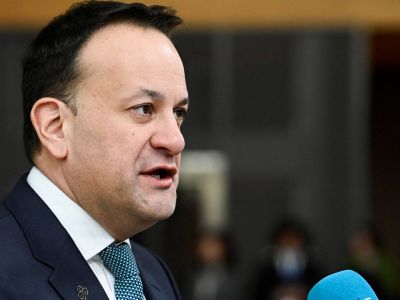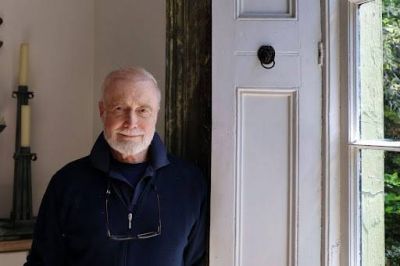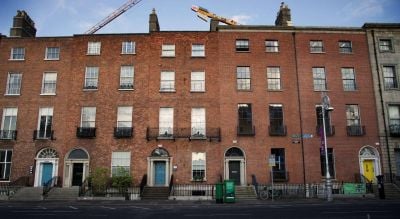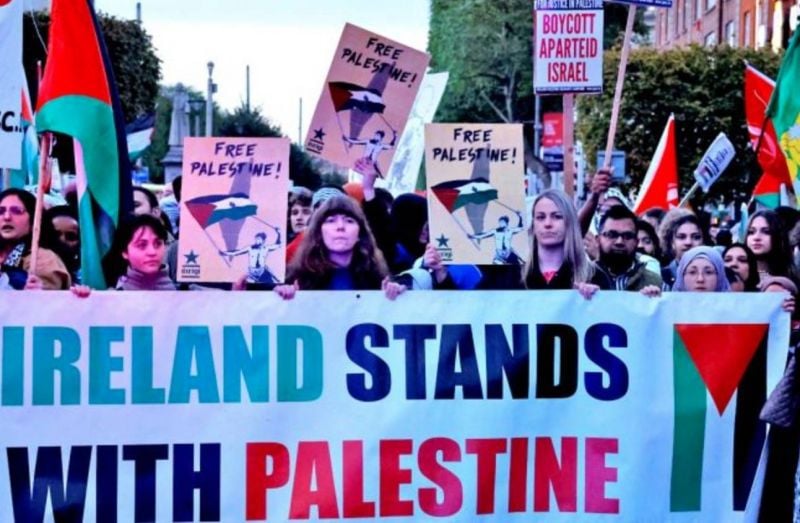
The Stand with Palestine protest in Dublin. October 2023 (Credit: Clodagh Kilcoyne/Reuters)
BEIRUT — While most of the Irish public is pro-Palestine, Ireland’s politicians both at home and in the European Parliament should step up measures to end the bloodshed in Gaza, Irish politician Clare Daly told L’Orient Today in recent days.
Daly, who has been a member of the European Parliament (MEP) since 2019, criticized European political figures, who have had “trouble recognizing that Palestinians are human beings, with the same rights as everyone else.”
Her comments come as many Irish civilians have voiced support in recent weeks for Palestinians under Israeli fire in Gaza, even as the European Union does little to stop the carnage.
The disconnect has also highlighted a decades-long history of Irish popular support for the Palestinian cause.
Despite a temporary “humanitarian pause” last week, fighting has resumed, with Israeli bombardment on the besieged Gaza Strip killing more than 16,000 Palestinians since the start of the war.
The left-wing Independents 4 Change party, of which Daly is part, has adamantly advocated for Palestine in the EU Parliament since Oct. 7.
“The EU should urgently call for a ceasefire,” Daly told L’Orient Today. “Beyond that, we should place an arms embargo on Israel, suspend the EU-Israel Association Agreement on human rights grounds, and push for accountability for violations of international law,” she stressed.
Ireland has a history of supporting Palestine, but not everyone on the island has been on the same page lately.
Colonial trauma
Where does Ireland’s legacy of support for Palestine come from?
“I guess the historical connection is the obvious one. Ireland has a legacy of experiences of colonialism,” explained Brendan Ciaran Browne, a professor of conflict resolution at Trinity College Dublin’s Belfast campus, in Northern Ireland.
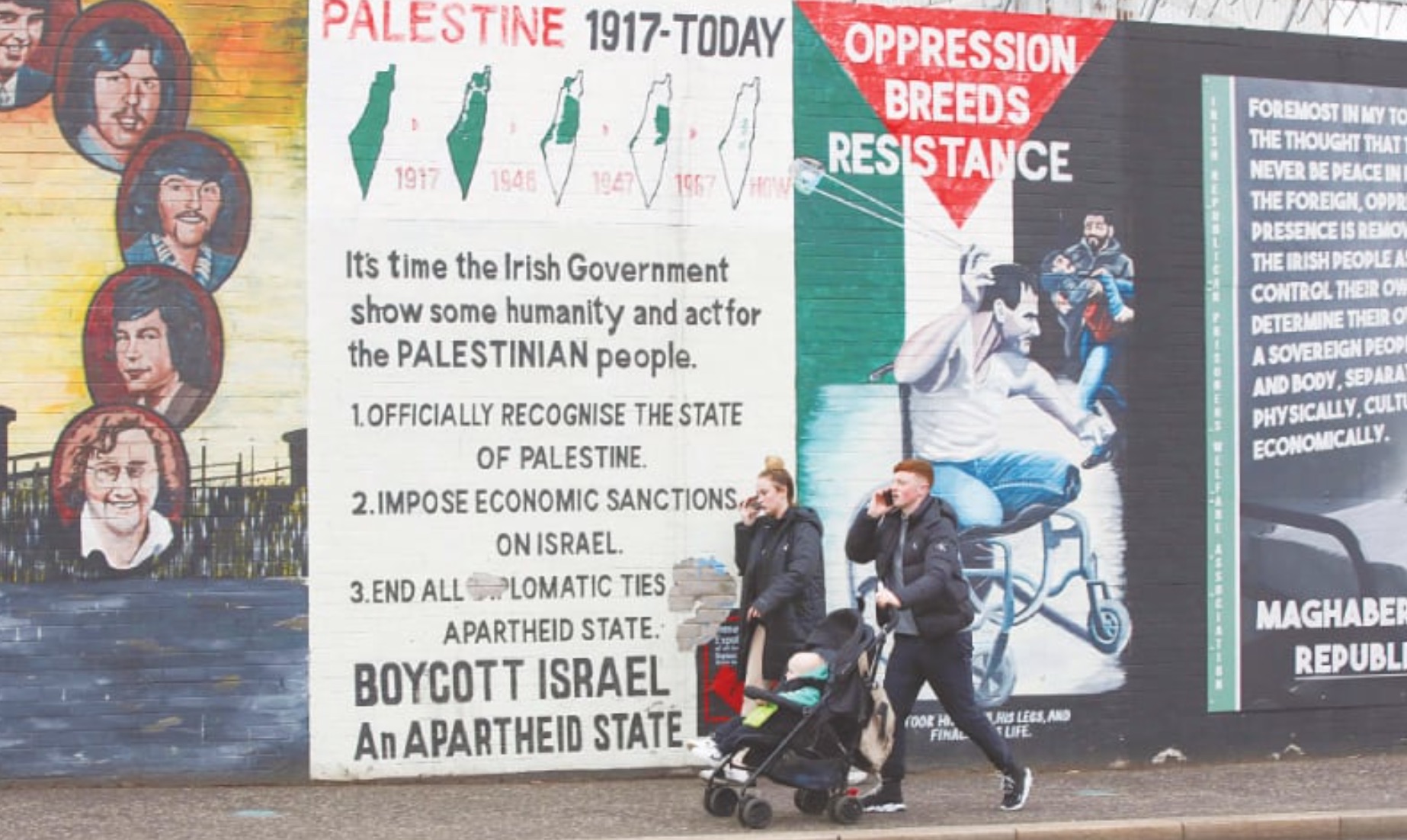 A pro-Palestinian mural on a section of the "peace wall" that separates Catholic and Protestant neighborhoods in Belfast, Northern Ireland. (Credit: AFP)
A pro-Palestinian mural on a section of the "peace wall" that separates Catholic and Protestant neighborhoods in Belfast, Northern Ireland. (Credit: AFP)
This goes back to 1171, when upon landing on the island’s shores, Henry II of England declared himself Lord of Ireland. In the early 1600s, organized colonization of Ulster (Ireland’s nine northern counties) began, and settlers started to arrive from Great Britain.
“We have experiences of our language, culture, sports, identity, and religion being suppressed by colonialism. So, I think we’re almost predisposed to have natural empathy when it comes to those who are struggling for liberation,” said Browne, a Belfast native.
Not long ago, Ireland was a battleground. The Irish War of Independence, also known as the Anglo-Irish War, was fought between the Irish Republican Army (IRA) and British forces from 1919 to 1921. While the conflict resulted in Irish victory and the formation of the Irish Free State, it also yielded a separate, British-ruled Northern Ireland, encompassing six northern counties.
After the Independence War, peace did not ensue. A Civil War quickly followed from 1922 to 1923 between the IRA and a provisional Irish government over the Anglo-Irish Treaty, which, despite ending the Independence War, rendered the Irish Free State a “self-governing dominion of the British Empire.”
Northern Ireland would remain on a trajectory of violence well after the official declaration of the Republic of Ireland in 1949.
For decades, the North was ravaged by an ethno-nationalistic conflict known as the Troubles, which ended officially in 1998 with the signing of the Good Friday Agreement.
Ireland has a history of engagement with the Palestinian cause and was among the first European countries to recognize the Palestine Liberation Organization (PLO) in 1980.
The IRA and the Palestinian Authority (PA) even supported one another with arms trade and military training during the Troubles.
The IRA, notorious for having carried out bombings and targeted attacks during the Troubles both on the Island and in the UK, is listed as a terrorist organization by many countries. Its political successor is today’s left-wing, nationalist party Sinn Féin.
‘Both sides-ism’
Despite a general leaning towards the Palestinian cause, not all Irish parties approach the issue the same way, and some have even wavered amid the current war in Gaza.
“There has been a move towards the center from both sides. If you talk about the center-right [parties], Fianna Fáil, Fine Gael, they’ve always been about ‘both sides-ism,’” said David Landy, a sociology professor at Trinity College Dublin.
Micheál Martin, the Fianna Fáil politician simultaneously serving as Ireland’s Tánaiste (deputy prime minister), Minister of Foreign Affairs and Minister of Defense, has in recent weeks backed Israel.
“Traditionally Fine Gael would have been more pro-Israel, and Fianna Fáil pro-Palestine,” Landy said.
“What’s happened is there has been a reverse. You have Fine Gael leaders speaking more robustly about what Israel is doing. And you have Fianna Fáil leader Micheál Martin providing photo ops to Israel.”
Even Sinn Féin is increasingly moving towards this “both sides-ism.”
But, in the days after Oct. 7, Sinn Féin’s party base was “unhappy that their leadership wasn’t making a more decisive call to expel [the Israeli] ambassador,” Browne said. After pressure from the party’s popular base, they managed to get a statement from the head of Sinn Féin calling for the expulsion of the ambassador.
“Behind the scenes, the Irish government is saying we need to keep the channels of communication open with the Israelis because we have Irish civilians in [Gaza].”
In the EU
Ireland was one of the countries to voice alarm when Olivér Várhelyi, the European Commissioner for Neighborhood and Enlargement tried to halt EU aid to Palestine in early October.
At the time, Reuters reported that Spain, Portugal, Luxembourg and Ireland publicly spoke against Várhelyi’s arbitrary move, while other countries did so behind the scenes, leading to the retraction of the decision.
“There is massive public support at home for Irish MEPs to be a voice here in Europe. There is no reason for any of us to hold back,” Daly told L’Orient Today.
“In 2009, the EU called for a ceasefire. In 2014, the EU called for a ceasefire. This time, no [unanimous] call for a ceasefire. This is very significant. It provides Israel with moral and political cover for what it is doing,” she continued.
Alongside Ireland, Belgium, France, Luxembourg, Malta, Portugal, Slovenia and Spain voted for a ceasefire at the UN General Assembly in October, along with non-EU member states Switzerland and Norway.
People power
Protests have taken place across the country, from college campuses to city centers.
Landy (one of Ireland’s 2,500 or so Jews) is part of an advocacy group called Jews for Palestine, which recently organized a protest outside the German embassy in Dublin.
“The reasons [Germany] has given to support what Israel is doing is ‘it would be antisemitic otherwise,’” Landy explained, “so we thought a demonstration of Jews outside the embassy would be a useful intervention and it was.”
Daly said “the Irish voice has been strong in the last few months,” but it has “largely come from ordinary people, civil society and opposition parties.”
“Ireland is a small country, but we have international influence. We should use every scrap of it now to stop the killing. We can and must denounce the West's position from within the West,” she added.
“ We need the government to step up. It would mean a great deal if the EU Member States spoke up forcefully.”
